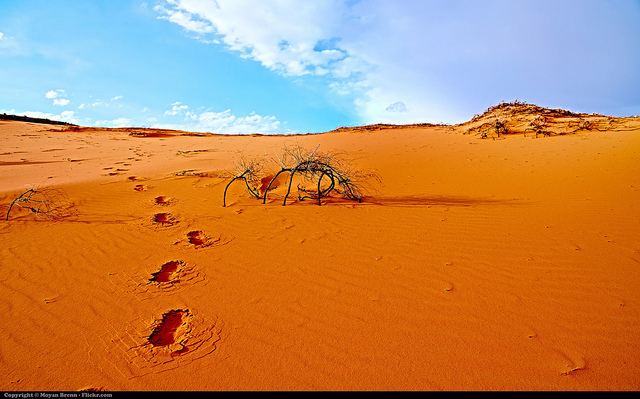I was driving on a completely deserted two-lane back road on my way from Phoenix, Arizona to Santa Barbara, California when ahead of me I could see a dot moving along the shoulder.
I couldn’t tell exactly what it was, but I could tell that it was moving slowly forward in the same direction as me. The closer I got to it the more clear it became that it was a man jogging—not running as if he was in training for an athletic event, or walking as if he had run out of gas and was going for help—but jogging along the side of the road in a slow but steady cadence.
I was mesmerized.
What was he doing out there? If there’s still a middle of nowhere left in this world that old two-lane highway west of I-10 in the heart of the Sonoran Desert could qualify.
As I drove slowly by and passed the man I could see that he was wearing only a kind of leather loin cloth. The skin on his back and legs was brown and glistening under the effort of his movement and he was carrying a large staff that he was holding upright several inches above the ground. A collection of what appeared to be small gourds and ornamental feathers attached to the end of the staff moved and bounced with each step. On his head was a small leather headdress.
He appeared to be entirely alone.
“I’m pulling off the road,” I said to my husband. “That man’s running for a reason and I don’t want to just drive by as if driving by is more important than what he’s doing. I want to acknowledge his effort.”
And that’s what I did.
I went about a half mile ahead, pulled the car off the road, and stood by the side—far back from where the man might be so as to give him room.
My husband had decided to stay in the car and when I got out, the kind of silence that is unique to the desert fell around me punctuated only by the strange percussive rhythm of the gourds at the top of the running man’s staff. His approach took on an otherworldly sense and I could feel myself being pulled into it.
It was more than 100 degrees out. There was burning sun and grueling desert all around. The black top was hot and sticky, even steamy and I didn’t move. I didn’t make a sound. I just stood there waiting for him to get closer and witnessing his effort with my silence.
It seemed the most respectful thing to do.
In some way I knew what the man was doing was larger than life—certainly larger than me. In some way I also knew that whatever it was, it was ancient and holy and deeply personal while being, at the same time, vastly universal.
I felt entranced and blessed.
As the running man passed by where I stood his gaze remained unwavering on the road ahead. He didn’t look at me or make contact with me in any way. Not even a glance. And yet, I didn’t feel invisible to him. In fact quite the opposite. I felt vitally important to him in the way that witnesses to what is sacred and holy and larger than life are vitally important.
In the way that the doer and the witness to the doing become one.
After the man had passed I stood by the road a good 15 minutes watching him shrink into the horizon, knowing I’d had a grace-filled moment, a moment in which everything had stopped and narrowed down to that one thing, that one effort—perhaps even that one ritual.
No matter what it was, by following my instinct, I’d shared in the solitary peace and magic of the moment and it became part of me.
I rejoined my husband in our car and proceeded down the road only to overtake the runner and find, about a mile beyond him, a van parked with two men in it. One of the men was sitting behind the wheel and the other was leaning against the bumper with the van doors open, watching back down the road behind me.
The men being there gave me a sense of completion. The running man wasn’t entirely alone. There were others watching for him. Waiting for him.
Today I remain grateful for those of us who have the courage and the strength of will to carry a tradition, even a sacrifice forward into the sun no matter how hot and no matter many miles there are to run.
Today I am especially grateful that I’d had the instinct to park my car, get out of it and stand by the side of the road to witness the running man and what he was doing.
No matter how many other cars had gone by—without stopping.
I have never forgotten that moment of the running man and his staff, and the peace that came with it.
Relephant Reads:
It’s Okay to Keep People Waiting.
~
Author: Carmelene Siani
Editor: Travis May
Photos: Flickr/Moyan Brenn







Read 2 comments and reply